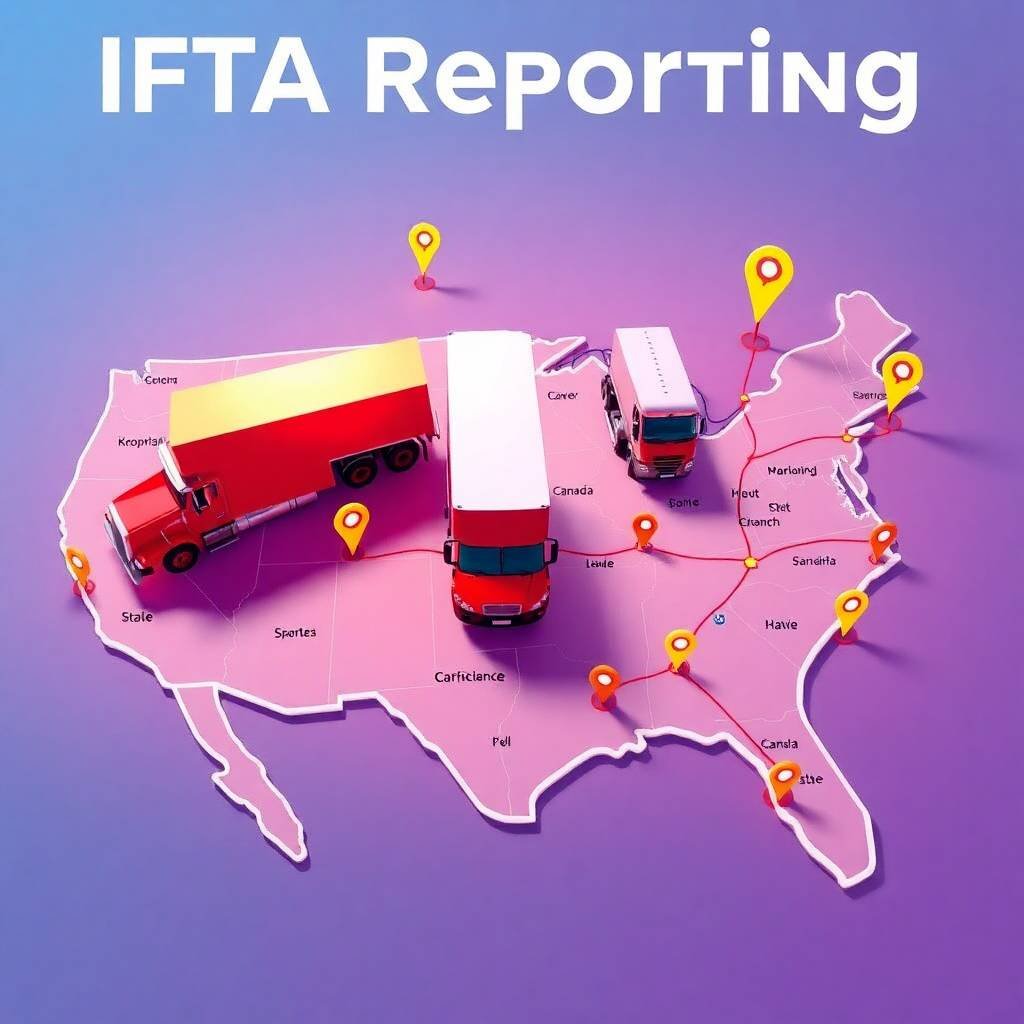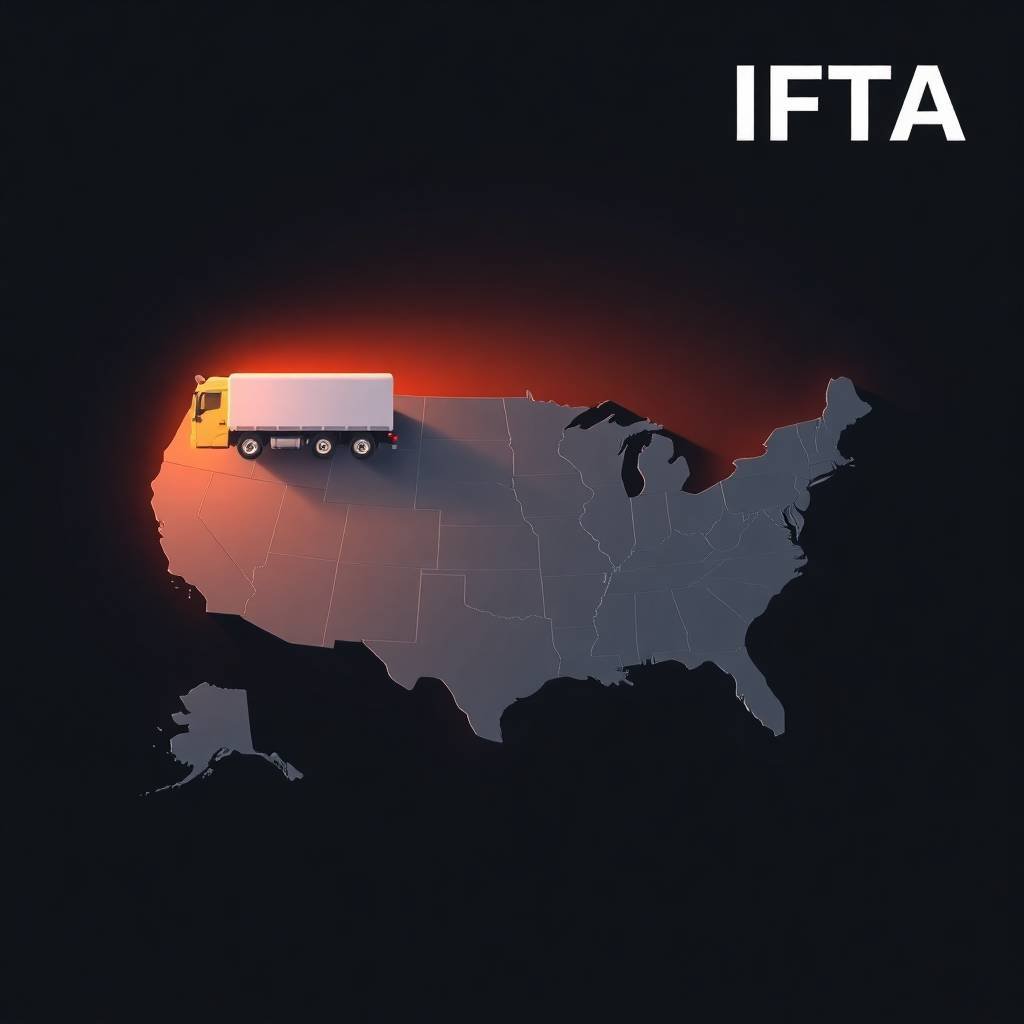1. Understand the Basics: What Are IFTA Filing Requirements?
Navigating the world of commercial trucking compliance can be overwhelming, especially when it comes to IFTA Filing Requirements. The International Fuel Tax Agreement (IFTA) simplifies fuel tax reporting for carriers that operate in multiple jurisdictions, but it also requires diligent recordkeeping and timely filing.
Below, we break down the basics of IFTA, so you can understand your obligations and avoid costly penalties.
What Is IFTA?
The International Fuel Tax Agreement (IFTA) is a cooperative agreement among the 48 contiguous U.S. states and 10 Canadian provinces. It enables qualified motor carriers to file a single quarterly fuel tax return that covers all member jurisdictions.
IFTA Filing Requirements are designed to ensure that fuel taxes are fairly distributed based on where fuel is consumed, not just where it is purchased.
Who Must Comply with IFTA Filing Requirements?
Any motor carrier operating a qualified vehicle — typically those with three or more axles or weighing over 26,000 pounds — across state lines must comply with IFTA Filing Requirements. Failure to comply can result in penalties, audits, or suspension of your IFTA license.
Key IFTA Filing Requirements to Know
To remain compliant, carriers must:
- Maintain accurate fuel and mileage records
- File quarterly IFTA returns
- Pay any taxes due
- Display valid IFTA decals on each vehicle
Carriers should also stay up-to-date with any changes published by agencies like the Federal Motor Carrier Safety Administration (FMCSA) and the U.S. Department of Transportation (DOT).
For deeper insights into compliance, review our guides on FMCSA Compliance Mistakes and DOT Audit Preparation for 2025.
Filing IFTA the Right Way
The IFTA filing process involves submitting your fuel use and mileage logs quarterly. Any discrepancies can trigger audits, so working with professionals who specialize in IFTA, IRP, and BOC-3 Support can save you time and prevent issues.
Don’t miss a deadline—schedule your appointment with our team for personalized assistance.
Boost Your Compliance Strategy
Beyond IFTA, ensure full compliance by maintaining DQ File Setup and Monitoring, managing Drug and Alcohol Testing, and following the DOT Compliance Checklist.
Helpful articles include:
- Driver Qualification File Requirements
- FMCSA Clearinghouse Compliance
- Random DOT Drug Testing Requirements
- Pre-Employment DOT Drug Testing
Stay informed with our latest blog posts and learn how we can assist with your UCR Filing.
Additional Resources and Support
For more help, check out:
- FMCSA Compliance Help for Trucking Companies
- FMCSA Services for Owner-Operators
- Owner-Operator Support Services
We’re here to help you stay on the road and out of regulatory trouble.
Legal and Privacy Policies
Before using our services, please review our Disclaimer, Privacy Policy, and Terms of Service.
Understanding and meeting IFTA Filing Requirements is a critical part of operating legally and efficiently in the trucking industry. Let Truckers Compliance Hub be your partner in achieving total regulatory compliance.

2. Know Your Deadlines to Avoid Late Filing Penalties
Missing deadlines for transportation compliance can lead to hefty penalties, especially when it comes to IFTA filing requirements. Whether you’re a fleet operator or an owner-operator, staying compliant is critical to avoiding unnecessary fines and operational disruptions. This article will guide you through the essentials of IFTA filing requirements, offering valuable insights, compliance resources, and actionable steps to stay on track.
Why IFTA Filing Requirements Matter
The International Fuel Tax Agreement (IFTA) is a crucial tax collection agreement among the lower 48 states and Canadian provinces. Carriers operating across state lines must file quarterly fuel use tax returns. Understanding and meeting IFTA filing requirements ensures you remain in good standing with your base jurisdiction and avoid audits or penalties.
When deadlines are missed, states can impose late fees, revoke licenses, or assess additional taxes. For a thorough overview of federal guidelines, you can reference the U.S. Department of Transportation and FMCSA websites.
Common Mistakes in Meeting IFTA Filing Requirements
One of the most frequent mistakes in managing IFTA filing requirements is inaccurate or incomplete mileage and fuel records. This issue often overlaps with broader FMCSA compliance mistakes that affect your entire operation. Another common error is failing to reconcile trip reports, which could lead to a mismatch during a DOT audit.
To avoid such pitfalls, leverage our DOT Audit Preparation Service to get professional guidance.
Tools and Services That Can Help
Proper documentation and monitoring are key. Our IFTA, IRP & BOC-3 Support service helps streamline IFTA filing requirements compliance. Whether you need quarterly filings or help with account setup, our experts are ready to assist.
Further streamline your process with support services like DQ File Setup and Monitoring and Drug and Alcohol Testing Management, which integrate seamlessly with broader compliance strategies like driver qualification file requirements and random DOT drug testing requirements.
Key Compliance Resources and Planning Tools
To ensure you’re aligned with all IFTA filing requirements, regularly review our Compliance Hub where you’ll find updates and insights. Popular posts like FMCSA Clearinghouse Compliance and DOT Compliance Checklist provide detailed action plans.
For a more tailored experience, schedule a one-on-one consultation with one of our compliance specialists.
Prepare Now to Avoid Penalties Later
The cost of missing IFTA filing requirements can be significant. Our resources for owner-operators and trucking companies are designed to simplify compliance and provide peace of mind. Additional posts, such as DQ File Violations and Pre-Employment DOT Drug Testing Requirements, reinforce the importance of comprehensive documentation.
Stay Compliant Year-Round
Avoid scrambling at the last minute by marking your calendar with all IFTA deadlines. Consider using our UCR Filing Assistance and Driver Drug and Alcohol Testing Program services to stay compliant with FMCSA regulations. Staying ahead of IFTA filing requirements is just one part of a larger compliance strategy.
Learn More and Protect Your Business
Explore our full suite of compliance services here. For transparency and legal coverage, please review our Disclaimer, Privacy Policy, and Terms of Service.
Taking charge of your IFTA filing requirements today helps you avoid costly penalties tomorrow. Stay compliant, stay safe, and stay profitable.

3. Choose the Right Record-Keeping System
In the trucking industry, proper documentation isn’t just good practice—it’s essential. A reliable record-keeping system is the foundation of meeting IFTA filing requirements, maintaining DOT compliance, and preventing costly violations. Whether you’re an owner-operator or manage a fleet, understanding how to organize and maintain your records is critical for smooth operations and regulatory peace of mind.
Why Record-Keeping Matters for IFTA Filing Requirements
IFTA filing requirements mandate accurate tracking of fuel purchases, mileage per jurisdiction, and operational data on a quarterly basis. Without an efficient record-keeping system, these filings become a logistical nightmare. Errors or missing data can trigger audits or fines and impact your ability to stay compliant with federal regulations, such as those set by the FMCSA and U.S. Department of Transportation.
To better understand how regulatory compliance connects with record management, explore our DOT Compliance Checklist and FMCSA Compliance Requirements for Trucking Companies.
Key Elements of a Strong Record-Keeping System
A good record-keeping system should help meet IFTA filing requirements by accurately capturing:
- Fuel receipts and invoices
- Trip sheets or ELD data
- Mileage logs by jurisdiction
- Maintenance records
- Driver qualification files
All of this documentation is vital, not just for IFTA but also for avoiding DQ file violations and ensuring driver qualification file requirements are met.
Our DQ File Setup and Monitoring service simplifies the process of managing these critical files, offering peace of mind and audit readiness.
Digital Tools vs. Manual Tracking
Many carriers still rely on spreadsheets or paper logs, but these outdated methods can make meeting IFTA filing requirements unnecessarily difficult. Transitioning to a digital record-keeping solution helps reduce errors, streamline reporting, and maintain real-time visibility of your fleet’s operations.
Incorporating our IFTA, IRP & BOC-3 Support can further automate and simplify IFTA compliance. These solutions integrate with your existing workflows and help you meet quarterly deadlines without stress.
Compliance Beyond IFTA
Record-keeping also plays a critical role in other compliance areas such as drug and alcohol testing, pre-employment testing, and random testing. Our Drug and Alcohol Testing Management program helps you maintain all required records for FMCSA audits.
Additionally, visit our resources on FMCSA Clearinghouse Compliance and the Safety Measurement System 2025 to understand how data accuracy influences your compliance rating.
Schedule Professional Assistance
If you’re uncertain whether your current system meets IFTA filing requirements, our experts are here to help. Schedule a 30-minute consultation for personalized guidance and compliance strategy.
Explore more posts on Truckers Compliance Hub to stay updated on regulatory changes and best practices. You can also visit:
- FMCSA Compliance Services for Owner-Operators
- Compliance Help for Trucking Companies
- DOT Audit Preparation
- UCR Filing Assistance
Conclusion
Meeting IFTA filing requirements doesn’t have to be overwhelming. With the right record-keeping system and access to professional tools, you can avoid penalties, pass audits, and stay ahead of the curve. Learn more through our Disclaimer, Privacy Policy, and Terms of Service, and take the first step toward stronger compliance today.

4. Master Fuel Receipt Management for Accurate Filings
In the trucking industry, meeting IFTA filing requirements accurately and on time is critical. One of the most overlooked yet vital components of this process is fuel receipt management. Misplaced, illegible, or incomplete fuel records can lead to reporting errors, audit complications, and costly penalties. To remain compliant and efficient, every carrier—whether a large fleet or a solo operator—must master the organization and retention of fuel receipts.
Why Fuel Receipts Matter for IFTA Filing Requirements
IFTA filing requirements demand detailed documentation of fuel purchases, including date, location, gallons purchased, price per gallon, and the type of fuel. These details support mileage reports and help ensure taxes are accurately allocated among jurisdictions.
Failing to maintain proper receipts can result in audits or assessment estimates by your base jurisdiction. To avoid this, reference our DOT Compliance Checklist and FMCSA Compliance Requirements for Trucking Companies for a broader compliance strategy.
How to Organize Fuel Receipts Effectively
To stay ahead of IFTA filing requirements, implement a system that organizes receipts both digitally and physically. Use scanning apps, cloud storage, and labeled folders by quarter and jurisdiction. Each receipt should include:
- Date of purchase
- Name and address of fuel station
- Number of gallons purchased
- Type of fuel
- Price per gallon
- Vehicle identifier (truck number)
This level of detail supports clean IFTA reporting and can be easily reviewed during a DOT audit. Our DOT Audit Preparation Service ensures you’re audit-ready with properly maintained documentation.
Tools and Services to Support Compliance
Managing IFTA filing requirements doesn’t have to be overwhelming. Our IFTA, IRP & BOC-3 Support service helps truckers stay organized, ensuring that receipts are properly recorded and reports are filed accurately and on time.
Additionally, services like DQ File Setup and Monitoring and Drug and Alcohol Testing Management complement fuel receipt organization by maintaining other essential compliance records.
The Broader Impact of Accurate Record-Keeping
Accurate fuel receipt management not only helps meet IFTA filing requirements, but also reduces your exposure to broader FMCSA scrutiny. Issues such as DQ file violations, random drug testing requirements, and FMCSA compliance mistakes often tie back to poor record-keeping.
We also recommend reviewing your practices in connection with FMCSA Clearinghouse Compliance, Safety Measurement System updates, and pre-employment drug testing requirements to ensure consistency across your operations.
Schedule a Personalized Compliance Review
Need help organizing your fuel receipts or evaluating your compliance strategy? Schedule a consultation to speak with one of our experts. For continuous guidance, explore our latest insights on the Truckers Compliance Hub blog.
Explore valuable services and resources tailored for your business:
- FMCSA Compliance Services for Owner-Operators
- Compliance Help for Trucking Companies
- UCR Filing Assistance
- Driver Drug and Alcohol Testing Program
Final Thoughts
Mastering fuel receipt management is an essential step toward fulfilling IFTA filing requirements and avoiding penalties. Establishing a solid system today can protect your business tomorrow. Be sure to also review our Disclaimer, Privacy Policy, and Terms of Service for further transparency.
With the right tools, services, and support, staying compliant becomes not only possible—but simple.

5. Implement GPS and ELDs to Automate Trip Tracking
Efficient trip tracking is no longer optional—it’s essential for accurate reporting and compliance with IFTA filing requirements. By implementing GPS and ELD (Electronic Logging Device) technologies, carriers and owner-operators can automate data collection, reduce human error, and ensure seamless IFTA reporting. This article explores how automation with GPS and ELDs supports compliance, reduces workload, and keeps your fleet audit-ready.
The Role of GPS and ELDs in Meeting IFTA Filing Requirements
Accurate trip tracking is a cornerstone of IFTA filing requirements, which mandate precise recording of mileage driven in each jurisdiction. Manually recording distances is time-consuming and prone to errors, which can lead to FMCSA compliance mistakes and even audits. GPS devices paired with ELDs automatically log mileage and location data, ensuring that every mile is accounted for and easily accessible for quarterly IFTA filings.
To ensure that your ELD system aligns with current FMCSA guidelines, refer to FMCSA.gov and Transportation.gov. These resources offer updates and mandates that directly affect your operational strategy.
Automate Compliance to Reduce Risk
When it comes to IFTA filing requirements, compliance is more than a best practice—it’s a legal obligation. Automating your trip logs not only keeps you on the right side of regulatory authorities, it also streamlines your broader FMCSA compliance requirements. Paired with services like DOT Audit Preparation and DQ File Setup and Monitoring, automation ensures you’re covered from all angles.
To further improve compliance, you can cross-reference automated trip logs with data from driver qualification files and drug and alcohol testing compliance, integrating your records for full oversight.
Benefits of Integrated ELD and GPS Systems
Integrated GPS and ELD systems eliminate the need for manual data entry, a major source of error in meeting IFTA filing requirements. These systems also:
- Provide real-time data visibility
- Improve route planning and fuel efficiency
- Minimize audit risk with time-stamped, verifiable logs
- Reduce labor hours dedicated to recordkeeping
Review our IFTA, IRP & BOC-3 Support Services to discover how we help streamline these systems for clients, ensuring compliance without the headache.
Stay Ahead with Proactive Compliance Tools
Proactively managing your compliance with automated systems prepares your fleet for audits and helps you avoid violations like DQ file violations or random DOT drug testing requirements. Stay informed by exploring the FMCSA Safety Measurement System SMS 2025 and aligning your tech with future-focused strategies.
Need help getting started? Schedule a consultation with one of our experts to find the right GPS/ELD solution for your operation.
Get the Full Support You Need
For complete IFTA compliance, technology must be paired with expert support. Our UCR Filing Assistance, Drug and Alcohol Testing Management, and broader FMCSA compliance services for owner-operators are designed to keep your business on track.
You can always refer to our main site, Truckers Compliance Hub, for the latest insights, including updates on FMCSA Clearinghouse Compliance and driver drug and alcohol testing programs.
Explore more valuable resources:
And don’t forget to review our Disclaimer, Privacy Policy, and Terms of Service for full transparency.
Final Thoughts
Adopting GPS and ELDs is a smart, proactive move toward meeting IFTA filing requirements with confidence. It’s not just about automation—it’s about building a compliant, efficient, and scalable operation that supports long-term success.

6. Understand Jurisdiction Rules and Regional Differences
For carriers and owner-operators, compliance with IFTA filing requirements goes beyond simply tracking miles and fuel. One of the most overlooked aspects is understanding jurisdiction-specific rules and the regional differences that affect tax calculations, reporting timelines, and audit preparedness. Whether you’re crossing state lines or managing a multi-jurisdiction fleet, staying informed can mean the difference between smooth operations and costly penalties.
IFTA Filing Requirements Vary by Jurisdiction
While the International Fuel Tax Agreement (IFTA) creates a unified reporting framework, IFTA filing requirements still vary based on individual jurisdictional rules. Each participating jurisdiction may set its own deadlines, audit protocols, and supporting document requirements. It’s essential for carriers to stay current with updates from official sources like FMCSA.gov and Transportation.gov.
Understanding these nuances helps ensure accurate filings and prevents issues such as DQ file violations or FMCSA compliance mistakes.
Why Regional Differences Matter in IFTA Compliance
Certain jurisdictions enforce stricter documentation for fuel receipts, GPS tracking, or trip logs, impacting how you meet your IFTA filing requirements. For instance, some states may require daily mileage logs, while others may accept summarized reports.
To help navigate these complex demands, Truckers Compliance Hub provides ongoing insights into industry updates and jurisdiction-specific tips, including helpful tools like our DOT Compliance Checklist and FMCSA Safety Measurement System SMS 2025 guidance.
How to Stay Compliant Across Jurisdictions
Meeting IFTA filing requirements begins with proper recordkeeping, including accurate fuel receipts, mileage by jurisdiction, and trip documentation. Tools like ELDs and automated GPS can help ensure precision, but they must be matched with compliance best practices.
Our IFTA, IRP & BOC-3 Support service ensures your documentation aligns with specific state requirements, giving you confidence during audits. You can also explore DOT Audit Preparation and DQ File Setup and Monitoring for deeper compliance integration.
Don’t overlook other regulatory requirements such as drug and alcohol testing compliance and driver qualification file requirements, both of which play a role in fleet audit readiness.
Expert Support for IFTA and FMCSA Compliance
Trying to manage jurisdictional differences alone can be overwhelming. Fortunately, our expert team is ready to help. Schedule an appointment today to receive one-on-one guidance on how to align your operation with IFTA filing requirements across all jurisdictions.
We also offer targeted services like Drug and Alcohol Testing Management and UCR Filing Assistance to support your compliance journey.
For more information, check out our resources on:
- FMCSA Compliance Help for Trucking Companies
- Compliance Services for Owner Operators
- Owner Operator Support Services
Trust the Experts at Truckers Compliance Hub
At Truckers Compliance Hub, we specialize in helping fleets of all sizes comply with both federal mandates and IFTA filing requirements across diverse jurisdictions. We also offer insights on pre-employment DOT drug testing requirements, random DOT drug testing requirements, and driver drug and alcohol testing programs.
Please review our Disclaimer, Privacy Policy, and Terms of Service for full transparency.
By mastering jurisdictional differences, your operation can maintain accurate, timely, and audit-ready compliance with all IFTA filing requirements—no matter where your wheels roll.

7. Perform Regular Internal Audits for Peace of Mind
In the fast-paced world of commercial trucking, staying compliant with regulations is not optional—it’s essential. One of the most effective ways to ensure your operation stays on the right track is by conducting regular internal audits. These audits are not just about spotting mistakes; they provide clarity, confidence, and peace of mind—especially when it comes to meeting critical IFTA filing requirements.
Why Internal Audits Matter for IFTA Compliance
The International Fuel Tax Agreement (IFTA) requires carriers operating across state lines to track fuel use and mileage accurately for each jurisdiction. Small discrepancies or outdated processes can lead to fines or trigger an audit from regulatory agencies. Performing regular internal audits allows you to proactively identify and correct issues before they escalate into major problems.
To ensure you’re meeting IFTA filing requirements, audits should review fuel receipts, mileage logs, and trip records. This helps validate the accuracy of your IFTA returns while also confirming that your internal processes align with jurisdiction-specific expectations. For help with compliance strategy, visit Truckers Compliance Hub to access the latest insights and compliance support tools.
Common Issues Uncovered During Internal Audits
Internal audits often reveal common issues such as DQ file violations, missed drug and alcohol testing compliance, or inconsistencies in your driver qualification file requirements. These can have a ripple effect, influencing your performance metrics in the FMCSA Safety Measurement System (SMS) 2025.
Audits also verify that you’re maintaining alignment with federal expectations as outlined by FMCSA and Transportation.gov. Errors in logs, outdated files, or missing paperwork can jeopardize your standing and result in violations that affect your entire fleet.
Benefits of Staying Ahead with Regular Audits
When you consistently audit your records, you’re better prepared for DOT inspections and external audits. You also strengthen your ability to fulfill ongoing IFTA filing requirements accurately and efficiently. Regular internal reviews can enhance other aspects of compliance too, including pre-employment DOT drug testing and random DOT drug testing.
If you’re unsure where to begin, our DOT Audit Preparation and DQ File Setup and Monitoring services are excellent starting points. We can help identify gaps and implement corrective actions tailored to your fleet’s needs.
Partner With Compliance Experts
Trying to handle internal audits alone can be overwhelming. That’s why partnering with industry professionals is a smart move. Schedule a consultation today to receive hands-on support and get tailored solutions for meeting IFTA filing requirements and other compliance challenges.
We also offer solutions like IFTA, IRP & BOC-3 Support, Drug and Alcohol Testing Management, and UCR Filing Assistance—everything your fleet needs to stay compliant and audit-ready.
For deeper insights, don’t miss our articles on:
- FMCSA Compliance Help for Trucking Companies
- Compliance Services for Owner Operators
- Owner Operator FMCSA Services
Peace of Mind Through Proactive Compliance
Consistent internal audits provide peace of mind, reduce compliance risks, and ensure you continue to meet evolving IFTA filing requirements. They also help streamline other critical areas like FMCSA Clearinghouse Compliance and driver drug and alcohol testing programs.
Review our Disclaimer, Privacy Policy, and Terms of Service for full transparency.
With the right tools and team in place, your operation will be equipped to thrive—confidently and compliantly.

8. Use IFTA-Specific Software for Streamlined Reporting
Managing fuel taxes across multiple jurisdictions can quickly become overwhelming for motor carriers. That’s where IFTA-specific software proves invaluable. By leveraging automation, accuracy, and integration, this technology simplifies IFTA filing requirements, reduces human error, and helps carriers stay compliant year-round.
Simplify Complex IFTA Filing Requirements
The International Fuel Tax Agreement (IFTA) mandates that motor carriers file quarterly reports detailing fuel purchases and miles traveled in participating jurisdictions. Meeting IFTA filing requirements involves collecting precise trip data, maintaining fuel receipts, and calculating mileage per state.
IFTA-specific software automates this process, reducing the burden on administrative teams. Instead of relying on manual logs and spreadsheets, carriers can track mileage using GPS data, link fuel card purchases, and generate error-free reports ready for submission. By ensuring every mile and gallon is accounted for, carriers dramatically improve the accuracy of their IFTA, IRP & BOC-3 filings.
Prevent Penalties and Non-Compliance
Missing deadlines or submitting inaccurate data can lead to audits, fines, or license suspensions. Regular errors may also trigger review under the FMCSA Safety Measurement System (SMS) 2025. Automated IFTA software mitigates these risks by generating audit-ready records and ensuring ongoing compliance with IFTA filing requirements.
Integrating software with your fleet’s systems also strengthens other compliance areas such as DQ file setup and monitoring and driver qualification file requirements, which are crucial for passing DOT reviews. For full audit readiness, explore our DOT audit preparation services.
Improve Operational Efficiency
Manually compiling data for IFTA filing requirements can waste countless hours each quarter. With software, data is automatically captured and organized in real-time, giving fleet managers the ability to focus on operations rather than paperwork.
Software also complements other regulatory tools, such as drug and alcohol testing management. Ensuring compliance with programs like pre-employment DOT drug testing, random testing, and the FMCSA Clearinghouse is easier when digital records are accurate and accessible.
Stay Compliant Across All Fronts
Using the right software helps trucking companies meet not only IFTA filing requirements but also expectations set by FMCSA and Transportation.gov. For a complete list of compliance concerns—including DQ file violations, DOT compliance checklists, and drug and alcohol testing compliance—explore our full compliance hub.
If you’re an owner-operator or fleet manager needing tailored support, review our:
- FMCSA compliance help for trucking companies
- Owner-operator compliance services
- Specialized owner-operator services
Start Streamlining Today
Don’t wait for an audit to realize the importance of accurate IFTA records. Invest in IFTA-specific software and reduce the stress of compliance. To explore the best solutions for your business, schedule a consultation with our team today.
Stay informed with our latest blog updates and ensure you’re not making common FMCSA compliance mistakes or missing out on essential compliance requirements for trucking companies.
For transparency, view our Disclaimer, Privacy Policy, and Terms of Service. Let technology work for you and turn compliance into a competitive advantage.

9. Avoid These Common IFTA Filing Mistakes
Meeting IFTA filing requirements is a critical responsibility for motor carriers operating across state lines. Yet, despite its importance, many carriers make avoidable errors that can result in costly penalties, audits, or even license suspensions. Understanding where things often go wrong is the first step to maintaining compliance and peace of mind.
Mistake #1: Inaccurate Mileage Tracking
One of the most common errors when managing IFTA filing requirements is failing to track mileage accurately by jurisdiction. Whether due to manual logging, GPS errors, or inconsistent data entries, misreported miles can trigger an audit from agencies like FMCSA or lead to violations noted in the FMCSA Safety Measurement System (SMS) 2025.
Using reliable IFTA-specific software ensures that every mile is accounted for and attributed to the correct state. To enhance your operational accuracy, consider services such as IFTA, IRP & BOC-3 support offered by Truckers Compliance Hub.
Mistake #2: Missing Fuel Receipts
Another frequent issue is the failure to keep proper fuel receipts. IFTA audits often require proof of every fuel purchase, and not having documentation is a direct violation of IFTA filing requirements. Ensure that fuel purchases are logged with all necessary information: date, location, number of gallons, and seller details.
Linking fuel card data to digital systems helps mitigate this error and provides peace of mind during DOT audit preparation.
Mistake #3: Filing Late or Not at All
Missing the quarterly IFTA deadline is a major red flag. Late filings lead to automatic penalties and possible suspension of your IFTA license. To stay on top of deadlines, review our DOT compliance checklist and FMCSA compliance mistakes to avoid recurring issues.
Need help staying organized? Schedule a free consultation to keep your operation on track.
Mistake #4: Misunderstanding Filing Requirements
Each carrier’s reporting scenario may differ, and assumptions can lead to non-compliance. For instance, improperly applying exemptions or misunderstanding reporting thresholds can cause errors in your IFTA return.
Truckers should regularly review IFTA filing requirements through official sources like Transportation.gov and tap into expert guidance via Truckers Compliance Hub for updated industry insights.
Mistake #5: Neglecting Overall FMCSA Compliance
IFTA compliance doesn’t exist in isolation. It often intersects with other regulatory responsibilities including DQ file requirements, drug and alcohol testing compliance, and FMCSA Clearinghouse compliance.
Our tailored solutions for DQ file setup and monitoring and drug and alcohol testing management can help keep your fleet aligned with all federal and state requirements.
Compliance Made Easy
Avoiding these mistakes requires consistency, awareness, and the right support systems. Our team specializes in guiding carriers through every aspect of IFTA filing requirements, as well as UCR filing assistance and full regulatory support.
Explore our complete list of FMCSA compliance services for trucking companies, including owner-operator specific resources and expanded offerings.
For additional insights, view our latest updates on Truckers Compliance Hub and ensure you’re not missing critical pre-employment drug testing requirements or random DOT drug testing obligations.
Finally, please review our Disclaimer, Privacy Policy, and Terms of Service to better understand your rights and our commitment to transparency.

10. Get Help When Needed: Working With a Compliance Expert
Navigating IFTA filing requirements and other DOT regulations can be overwhelming, especially for small carriers and owner-operators. Filing late, submitting incorrect data, or failing to meet quarterly deadlines can lead to serious consequences—including fines, audits, and even suspended operating authority. That’s why partnering with a compliance expert can make all the difference in staying ahead of the curve and focused on running your business.
Why Compliance Support Matters
Whether you’re new to the industry or an experienced fleet owner, IFTA filing requirements demand detailed recordkeeping, jurisdiction-specific mileage, and timely reporting. Missteps in these areas can flag issues with the Federal Motor Carrier Safety Administration (FMCSA) or trigger red alerts in your FMCSA Safety Measurement System (SMS).
A compliance expert can guide you through everything from driver qualification file requirements to DOT audit preparation, and of course, the technical nuances of IFTA.
Understanding IFTA Filing Requirements in Detail
IFTA filing requirements are not just about fuel tax reporting—they also intersect with a broader DOT compliance ecosystem. Mileage logs, fuel receipts, trip sheets, and tax calculations must be properly maintained and submitted every quarter. This process must align with overarching compliance demands such as drug and alcohol testing and DQ file monitoring.
Our dedicated IFTA, IRP & BOC-3 support services ensure your filings meet both state and federal expectations without error.
Where a Compliance Expert Can Help
Compliance professionals understand the evolving landscape of FMCSA and Transportation.gov regulations. They assist with avoiding common FMCSA mistakes while ensuring your business meets IFTA filing requirements consistently.
Working with our team gives you access to valuable services like:
- DOT Audit Preparation
- DQ File Setup and Monitoring
- Drug and Alcohol Testing Management
- UCR Filing Assistance
To speak with a compliance expert directly, schedule your free consultation.
Streamline, Simplify, and Stay Compliant
Staying compliant with IFTA filing requirements isn’t just about avoiding fines—it’s about protecting your business and improving efficiency. At Truckers Compliance Hub, we provide not only guidance but also insight into pre-employment DOT drug testing, random testing requirements, and driver drug and alcohol testing programs.
Explore our full library of posts including FMCSA Clearinghouse compliance, FMCSA compliance requirements for trucking companies, and our DOT Compliance Checklist to stay informed.
Access the Help You Deserve
Don’t risk falling out of compliance. Our FMCSA compliance services for trucking companies, owner-operators, and expanded services are designed with your success in mind.
For more information, please review our Disclaimer, Privacy Policy, and Terms of Service. We’re here to support your journey to full compliance—starting with mastering your IFTA filing requirements.
4o

What are the basic IFTA filing requirements for new trucking companies?

The basic IFTA filing requirements include registering for an IFTA license, tracking mileage in all jurisdictions traveled, maintaining fuel purchase receipts, and filing quarterly returns. New carriers can get assistance with setup and ongoing compliance through IFTA/IRP/BOC-3 Support services from Truckers Compliance Hub.
How can I avoid errors when reporting mileage for IFTA filings?

To meet IFTA filing requirements accurately, use GPS or ELD systems to automate trip tracking and avoid manual errors. It’s also smart to conduct periodic internal audits. For help organizing records and ensuring accuracy, consider pairing this with DOT audit preparation services.
Are there any tools that help simplify IFTA filing requirements?

Yes, many carriers use software designed specifically to meet IFTA filing requirements more efficiently. However, for more tailored help, services like IFTA/IRP/BOC-3 Support can guide you through every step—from quarterly filings to maintaining proper documentation.
How often do I need to file under IFTA regulations?

Under IFTA filing requirements, carriers must file quarterly returns detailing miles driven and fuel purchased in each IFTA jurisdiction. Missing these deadlines can lead to penalties. Services such as UCR filing assistance often go hand-in-hand with IFTA compliance to ensure all regulatory filings are on time.
Can non-compliance with IFTA filing requirements affect my DOT audit?

Yes, non-compliance with IFTA filing requirements can negatively impact your DOT audit results. Keeping up with accurate and timely IFTA filings is part of maintaining a clean audit history. For broader compliance, DOT audit preparation services can help ensure you’re fully prepared across all requirements, including IFTA.
Igor Iturriaga is a transportation compliance expert and founder of Dynamic 305 Miami LLC. He helps owner-operators and fleets stay FMCSA-compliant and audit-ready. https://www.linkedin.com/in/igor-iturriaga-64503217/
